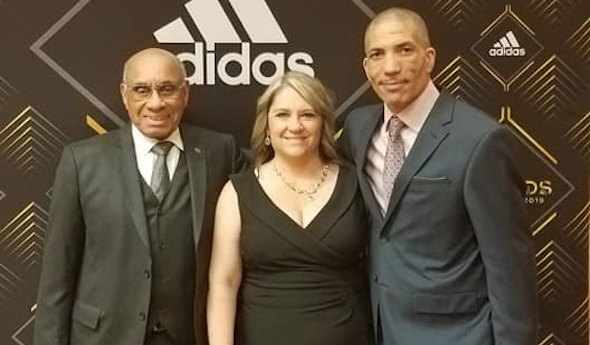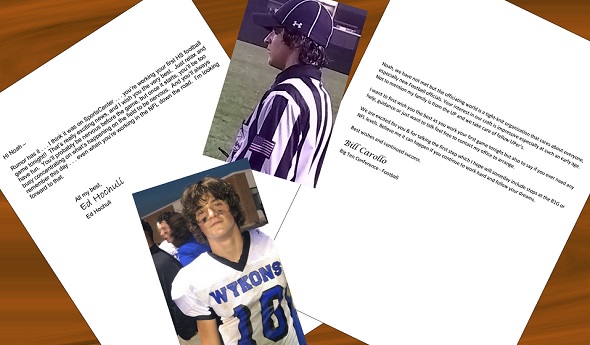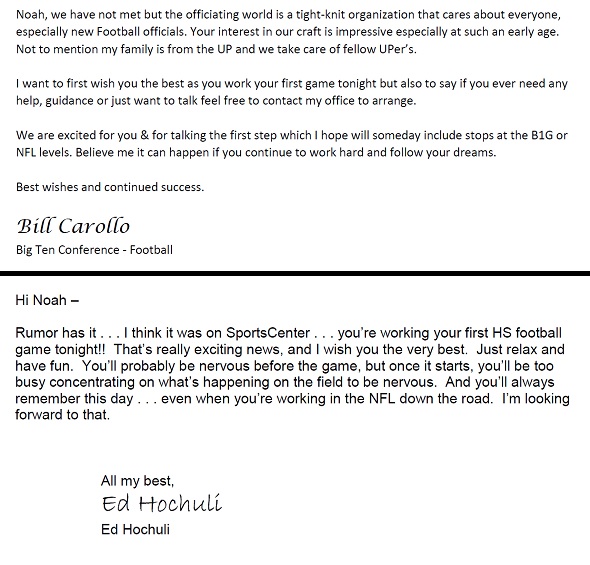
Flint's Phillips Named NHL 'Community Hero'
By
Paul Costanzo
Special for MHSAA.com
June 20, 2019
Rico Phillips had convinced himself before Wednesday night’s NHL Awards that he wasn’t going to win the Willie O’Ree Community Hero Award.
It was the easiest way to kill nerves that went along with having to speak in front of a room filled with NHL superstars and legends, as well as a national television audience.
But as the award was about to be announced, and a video montage started playing on the screen, the realization he could win started to come back to Phillips. Then O’Ree said his name.
“When I watched Willie O’Ree say my name, it was like this snapshot of time froze, and I was like, ‘No way,’” said Phillips, an MHSAA hockey official and the founder of the Flint Inner City Youth Hockey Program. “I embraced my wife. She has been the person that has been the best advisor to me, and to have her here with me was an incredible moment.”
Phillips was honored for founding and directing his organization, which has given a cost-free opportunity to play the game to about 150 kids ages 8-11 in Flint since 2010. He was one of three finalists, along with Tammi Lyncy of Washington, D.C., and Anthony Benavides of Detroit.
Fans submitted candidates for the award, and the field was whittled to the final three who were then voted on by the public.
The award is named after Hockey Hall of Famer O’Ree, who broke the NHL color barrier in 1958, and who has worked as the league’s diversity ambassador for more than 20 years. It is given to “an individual who – throughout the game of hockey – has positively impacted his or her community, culture or society,” according to a release from the NHL. This was the second year it has been awarded.
 “It was surreal, would be the first word,” Phillips said. “I felt an incredible honor – having just met Willie a couple months ago in person, he brings with him this magic. To look over and hear him say my name, it was like, ‘I can’t believe this is happening. Willie O’Ree – Willie O’Ree! – is giving me this award.”
“It was surreal, would be the first word,” Phillips said. “I felt an incredible honor – having just met Willie a couple months ago in person, he brings with him this magic. To look over and hear him say my name, it was like, ‘I can’t believe this is happening. Willie O’Ree – Willie O’Ree! – is giving me this award.”
Those who know Phillips could certainly believe it was happening, and that it was a well-deserved honor.
“I wasn’t surprised; I thought if anybody deserved that award, it was Rico,” said Steve Berriman, who serves as assigner and referee-in-chief for the Flint Ice Hockey Referees Association. “I was so darn proud; it was so well deserved. He’s immersed himself in the hockey culture. Whatever he’s accomplished has been all on Rico. He’s done it all himself. From where he’s started to where he’s come, and then the starting of this program, it’s 100 percent on him.”
Phillips, who is a firefighter in Flint, was introduced to the game during the 1980s and fell in love with it. He served as a student trainer for the hockey team at Flint Southwestern, and thanks to plenty of time spent with the officials while in that position, was convinced to get onto the ice wearing the stripes. He became an MHSAA registered official for ice hockey beginning with the 1990-91 season.
“I took up that challenge, and it was terrible at first, because I could barely skate,” Phillips said with a laugh. “One of the other challenges, besides learning how to skate, is that I was met with racial slurs and taunts. I was young, and it was tough. I thought, ‘What did I get myself into?’ I had some people who helped talk me through it.”
Phillips said those mentors explained to him that quitting would give those who taunted him what they wanted, and more than 30 years later, he’s still on the ice. He said he officiates about 40 high school games per year and has worked three MHSAA Semifinals and a handful of Quarterfinals.
It was during the late 1990s that the idea for the Flint Inner City Youth Hockey Program came to Phillips.
“As a hockey referee, in particular, it wasn’t just playing, I know the lack of cultural diversity (in hockey),” Phillips said. “It didn’t bother me, so to speak. But I thought, you know what, there’s something that can be done about this.”
About a decade later, he put the wheels in motion and went to the Flint-based Perani Hockey World to ask for financial assistance. Perani took things a step further, offering to outfit all of the players from head to toe, giving Phillips and his organization 54 sets of gear in total in the first year.
 After that first year, a funder fell through. But four years later, the United Way stepped in and provided funding to pay for ice time. The Flint Firebirds of the Ontario Hockey League have since stepped in to assist with ice time.
After that first year, a funder fell through. But four years later, the United Way stepped in and provided funding to pay for ice time. The Flint Firebirds of the Ontario Hockey League have since stepped in to assist with ice time.
“One of the things I appreciate about our program is that it’s a community collaborative effort,” Phillips said. “These folks give to us without a non-profit status.”
Since its inception, Phillips said that the program has served about 150 players. Each player not only receives gear and instruction at no cost, but also transportation to and from the arena.
“We have 12 that went on to continue playing hockey, which is huge,” Phillips said. “I’m very proud of that – I didn’t expect that. We help and seek out additional funding for our participants that come through to help with the cost as they move on. The kids that come to our program, they don’t understand or know about hockey or even ice skating. We’re taking these families and teaching them to love this sport.”
Phillips has been saddened by the decline of the sport in the Flint area, saying that when he began officiating there were more than 20 high school teams in the area, and now there are fewer than 10. He said he also struggles to fill his program each year.
He hopes that will change with the exposure that has come with this award.
“What I’m hoping is this opens up the doors a little more, that this brings some gravity,” Phillips said. “On the flip side, when talking about funding, (since he was announced as a finalist for the award) I’ve had owners of pro teams and others coming up to me saying, ‘We’re going to send you equipment and send you some funding.’ This definitely puts our program on the map – on the bigger map. It means a lot of more intense work that I have to do.”
The award also shined a positive light on Flint, which is something Phillips did not take for granted.
“It was an overwhelming response that I received from the community,” Phillips said. “There were watch parties – I just saw a video a little while ago of when the announcement was made, and they just went crazy. It means the world. I say this a lot of times, but there seems to be a dark cloud that likes to hang over Flint and has for decades. There are so many of us that are little lights that shine, and this was a big shining light. Every opportunity we get in Flint to pick our heads up and be proud is important.”
Click for more on the Willie O'Ree Community Hero Award.
PHOTOS: (Top) From right, Rico Phillips, wife Sandy and NHL Hall of Famer Willie O'Ree. (Middle) Phillips drops the puck for a face-off during the Division 3 Semifinal between Houghton and Riverview Gabriel Richard this winter. (Below) Phillips, left, with his award and the Nashville Predators' P.K. Subban. (Top and below photos courtesy of Rico Phillips.)

The Official View: Just the Beginning
By
Brent Rice
MHSAA Assistant Director
September 24, 2018
By Brent Rice
MHSAA Assistant Director
This week’s “Official” View features a Legacy official who received a couple of very cool letters of encouragement from some very important people in recognition of his first MHSAA football contest.
Noah Lewis, out of Iron River, plays wingback and cornerback for West Iron County. This past Thursday night he served as a head linesman for a subvarsity game with close monitoring from his dad from the sidelines and the rest of the crew.
However, letters from NFL veterans Ed Hochuli and Bill Carollo also provided him some unexpected sage advice. Hochuli told Noah to “Just relax and have fun,” while Carollo offered to be there for Lewis for guidance or to provide a listening ear.
It’s Official!
Report Writing 101: Officials should be submitting incident reports whenever documenting ejections, unusual situations, or sportsmanship praises or concerns. While we certainly don’t need reports that would challenge Dickens in the writing department (we do get some of these), we do need enough detail that a clear picture is painted of the event for those administrators and directors in the Association office who are not present for the actual incident.
The who, what, where, when, and why of writing all apply. We need to know who is involved (name and number), what occurred leading up to the incident, when it occurred during the contest and why the official took the action he or she did.
Language counts … while we appreciate your discreetness when foul language occurs, please write what was said and done in detail – this includes writing out profanities in the report rather than “#^$*@^~!” or “bleeping.”
As Joe Friday would say, “Just the facts.” We don’t need any fluff or opinion. This means you don’t need to say that the play was close, that you got it right, the day was “blustery” or that “the coach was clearly out of control.” Tell us just the things we need to know to create the setting and what was said and done that led to your action.
Finally, you must complete the report within 48 hours of the end of the contest. Sooner would be better. There is nothing worse than trying to speak to a coach or administrator about an incident when we don’t even have the side of the official(s) yet.
P.S. Run your report through spell and grammar check before submitting if you have the opportunity.
Rule of the Week
CROSS COUNTRY One of the visiting coaches approaches the referee and points out to her where logs have been placed across the course to make it more challenging. This coach objects to these artificial barriers.
Ruling: These artificial barriers on the course must be removed so the course is clear of these obstructions.
It’s Your Call
FOOTBALL This week we look at the enforcement of the blindside block foul in football. It’s 3rd-and-21 on Team A’s 26-yard line. The slot receiver, #8 for white, clearly commits a blindside block in violation of the rules. With forceful contact, he blocks an opponent who does not see the blocker approaching.
One of the keys to look for in this play on the field is offensive players returning back towards the line of scrimmage. The question this week is: What is the down and distance if Team B (a) accepts (b) declines the penalty?
Last Week’s IYC Ruling: The swimmer did not make a legal turn since he took additional strokes after turning toward the breast. While swimmers may turn and independently kick or glide after their head passes the backstroke flags, they may not take any additional arm pulls other than in the actual turning action (8-2-f-1).
The Official View
Here's a closer look at those notes received by Noah Lewis, the aspiring Legacy Program official from Iron River:


